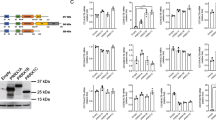We studied the effect of mesenchymal stromal cells on proliferation of CFSE-stained T cells in mixed and membrane-separated (Transwell) cultures and in 3D culture of mesenchymal stromal cells from Wharton’s jelly. The interaction of mesenchymal stromal cells with mitogen-activated peripheral blood lymphocytes from an allogeneic donor was followed by suppression of T-cell proliferation in a wide range of cell proportions. Culturing in the Transwell system showed the absence of suppression assessed by the fraction of proliferating cells and by the cell cycle analysis. In 3D cultures, contact interaction of mesenchymal stromal cells and lymphocytes was demonstrated that led to accumulation of G2/M phase lymphocytes and G0/G1 phase mesenchymal stromal cells. The suppressive effect of mesenchymal stromal cells from Wharton’s jelly is mediated by two mechanisms. The effects are realized within 6 days, which suggests that the therapeutic effects of mesenchymal stromal cells persist until their complete elimination from the body.
Similar content being viewed by others
References
Svirshchevskaya EV, Poltavtseva RA, Beletskii IP, Selezneva II, Sukhikh GT. Antiproliferative effects of mesenchymal stem cells and epithelial cells on lymphocytes. Bull. Exp. Biol. Med. 2016;161(4):518-522.
Ciccocioppo R, Cangemi G.C, Kruzliak P, Gallia A, Betti E, Badulli C, Martinetti M, Cervio M, Pecci A, Bozzi V, Dionigi P, Visai L, Gurrado A, Alvisi C, Picone C, Monti M, Bernardo ME, Gobbi P, Corazza GR. Ex vivo immunosuppressive effects of mesenchymal stem cells on Crohn’s disease mucosal T cells are largely dependent on indoleamine 2,3-dioxygenase activity and cell-cell contact. Stem Cell Res. Ther. 2015;6:137.
English K, Tonlorenzi R, Cossu G, Wood KJ. Mesoangioblasts suppress T cell proliferation through IDO and PGE-2-dependent pathways. Stem Cells Dev. 2013;22(3):512-523.
Fayyad-Kazan H, Faour WH, Badran B, Lagneaux L, Najar M. The immunomodulatory properties of human bone marrow-derived mesenchymal stromal cells are defined according to multiple immunobiological criteria. Inflamm. Res. 2016;65(6):501-510.
Gauthaman K, Yee FC, Cheyyatraivendran S, Biswas A, Choolani M, Bongso A. Human umbilical cord Wharton’s jelly stem cell (hWJSC) extracts inhibit cancer cell growth in vitro. J. Cell. Biochem. 2012;113(6):2027-2039.
He H, Nagamura-Inoue T, Takahashi A, Mori Y, Yamamoto Y, Shimazu T, Tsunoda H, Tojo A. Immunosuppressive properties of Wharton’s jelly-derived mesenchymal stromal cells in vitro. Int. J. Hematol. 2015;102(3):368-378.
Hu J, Zhang X, Zhou L, Zhang Y. Immunomodulatory properties of colonic mesenchymal stem cells. Immunol. Lett. 2013;156(1-2):23-29.
Krampera M, Cosmi L, Angeli R, Pasini A, Liotta F, Andreini A, Santarlasci V, Mazzinghi B, Pizzolo G, Vinante F, Romagnani P, Maggi E, Romagnani S, Annunziato F. Role for interferon-gamma in the immunomodulatory activity of human bone marrow mesenchymal stem cells. Stem Cells. 2006;24(2):386-398.
Le Blanc K, Rasmusson I, Götherström C, Seidel C, Sundberg B, Sundin M, Rosendahl K, Tammik C, Ringdén O. Mesenchymal stem cells inhibit the expression of CD25 (interleukin-2 receptor) and CD38 on phytohaemagglutinin-activated lymphocytes. Scand. J. Immunol. 2004;60(3):307-315.
Li Y, Qu YH, Wu YF, Liu L, Lin XH, Huang K, Wei J. Bone marrow mesenchymal stem cells suppressing activation of allogeneic cytokine-induced killer/natural killer cells either by direct or indirect interaction. Cell Biol. Int. 2015;39(4):435-445.
Najar M, Raicevic G, Boufker HI, Fayyad Kazan H, De Bruyn C, Meuleman N, Bron D, Toungouz M, Lagneaux L. Mesenchymal stromal cells use PGE2 to modulate activation and proliferation of lymphocyte subsets: combined comparison of adipose tissue, Wharton’s jelly and bone marrow sources. Cell. Immunol. 2010;264(2):171-179.
Ramasamy R, Tong CK, Seow HF, Vidyadaran S, Dazzi F. The immunosuppressive effects of human bone marrow-derived mesenchymal stem cells target T cell proliferation but not its effector function. Cell. Immunol. 2008;251(2):131-136.
Rasmusson I, Ringdén O, Sundberg B, Le Blanc K. Mesenchymal stem cells inhibit the formation of cytotoxic T lymphocytes, but not activated cytotoxic T lymphocytes or natural killer cells. Transplantation. 2003;76(8):1208-1213.
Spaggiari GM, Capobianco A, Becchetti S, Mingari MC, Moretta L. Mesenchymal stem cell-natural killer cell interactions: evidence that activated NK cells are capable of killing MSCs, whereas MSCs can inhibit IL-2-induced NK-cell proliferation. Blood. 2006;107(4):1484-1490.
Vellasamy S, Sandrasaigaran P, Vidyadaran S, Abdullah M, George E, Ramasamy R. Mesenchymal stem cells of human placenta and umbilical cord suppress T-cell proliferation at G0 phase of cell cycle. Cell Biol. Int. 2013;37(3):250-256.
Yang H, Sun J, Li Y, Duan WM, Bi J, Qu T. Human umbilical cord-derived mesenchymal stem cells suppress proliferation of PHA-activated lymphocytes in vitro by inducing CD4(+) CD25(high)CD45RA(+) regulatory T cell production and modulating cytokine secretion. Cell. Immunol. 2016;302:26-31.
Yildirim S, Zibandeh N, Genc D, Ozcan EM, Goker K, Akkoc T. The comparison of the immunologic properties of stem cells isolated from human exfoliated deciduous teeth, dental pulp, and dental follicles. Stem Cells Int. 2016;2016. id 4682875. doi: https://doi.org/10.1155/2016/4682875.
Author information
Authors and Affiliations
Corresponding author
Additional information
Translated from Kletochnye Tekhnologii v Biologii i Meditsine, No. 2, pp. 93-100, June, 2017
Rights and permissions
About this article
Cite this article
Poltavtsev, A.M., Poltavtseva, R.A., Yushina, M.N. et al. Proliferation of Peripheral Blood Lymphocytes and Mesenchymal Stromal Cells Derived from Wharton’s Jelly in Mixed and Membrane-Separated Cultures. Bull Exp Biol Med 163, 542–549 (2017). https://doi.org/10.1007/s10517-017-3846-3
Received:
Published:
Issue Date:
DOI: https://doi.org/10.1007/s10517-017-3846-3




